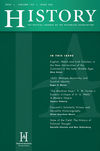
Are you looking for a journal that's not listed? Use the search box below to enter the Journal Title to see if we have access!


Examples of journals in this discipline include:
 American Historical Review
American Historical Review Journal of American History
Journal of American History Journal of Modern History
Journal of Modern History Public Historian
Public Historian History Can Be Open Source: Democratic Dreams and the Rise of Digital History by Locke, Joseph L., and Wright, Ben
In an ongoing commitment to experimentation, the AHR invited an "open peer review" of a submitted manuscript, "History Can Be Open Source: Democratic Dreams and the Rise of Digital History," by Joseph L. Locke (University of Houston–Victoria) and Ben Wright (University of Texas at Dallas). Given that Locke and Wright argued for the coexistence of transparency alongside formal academic peer review, subjecting their submission to an open review made sense. The peer review process itself tested the propositions about the democratization of scholarship they put forth in their submission. Their article appears in a new section of the AHR , "Writing History in a Digital Age," overseen by consulting editor Lara Putnam (https://ahropenreview.com/). The maturation of digital history has propelled historians' embrace of open educational resources. But, this article argues, open access licensing is not enough. Digital history's earliest practitioners promised not just more accessible digital materials, but a broader democratization of history itself. This article therefore moves beyond questions of technological innovation and digital access in the rise of digital history to engage more fundamental and intractable questions about inequality, community, and participatory historical inquiry. [ABSTRACT FROM AUTHOR]
History Can Be Open Source: Democratic Dreams and the Rise of Digital History by Locke, Joseph L., and Wright, Ben
In an ongoing commitment to experimentation, the AHR invited an "open peer review" of a submitted manuscript, "History Can Be Open Source: Democratic Dreams and the Rise of Digital History," by Joseph L. Locke (University of Houston–Victoria) and Ben Wright (University of Texas at Dallas). Given that Locke and Wright argued for the coexistence of transparency alongside formal academic peer review, subjecting their submission to an open review made sense. The peer review process itself tested the propositions about the democratization of scholarship they put forth in their submission. Their article appears in a new section of the AHR , "Writing History in a Digital Age," overseen by consulting editor Lara Putnam (https://ahropenreview.com/). The maturation of digital history has propelled historians' embrace of open educational resources. But, this article argues, open access licensing is not enough. Digital history's earliest practitioners promised not just more accessible digital materials, but a broader democratization of history itself. This article therefore moves beyond questions of technological innovation and digital access in the rise of digital history to engage more fundamental and intractable questions about inequality, community, and participatory historical inquiry. [ABSTRACT FROM AUTHOR]
 Metahistory as Public History: On Introducing Metahistorical Perspectives in Events about Events by Ola Innset
This article argues that the introduction of 'metahistorical perspectives' can greatly enrich the practice of public history. Through the example of a series of public events about important historical events held at the National Library of Norway, it is argued that an attention to microhistory, pedagogical theory and especially William Sewell Jr.'s theory of events can be beneficial when programming events for the general public. This focus on 'metahistorical perspectives' in the practice of public history stands in contrast to widely held notions of public history as entailing simplifications and 'dumbing down' of academic knowledge. [ABSTRACT FROM AUTHOR]
Metahistory as Public History: On Introducing Metahistorical Perspectives in Events about Events by Ola Innset
This article argues that the introduction of 'metahistorical perspectives' can greatly enrich the practice of public history. Through the example of a series of public events about important historical events held at the National Library of Norway, it is argued that an attention to microhistory, pedagogical theory and especially William Sewell Jr.'s theory of events can be beneficial when programming events for the general public. This focus on 'metahistorical perspectives' in the practice of public history stands in contrast to widely held notions of public history as entailing simplifications and 'dumbing down' of academic knowledge. [ABSTRACT FROM AUTHOR]